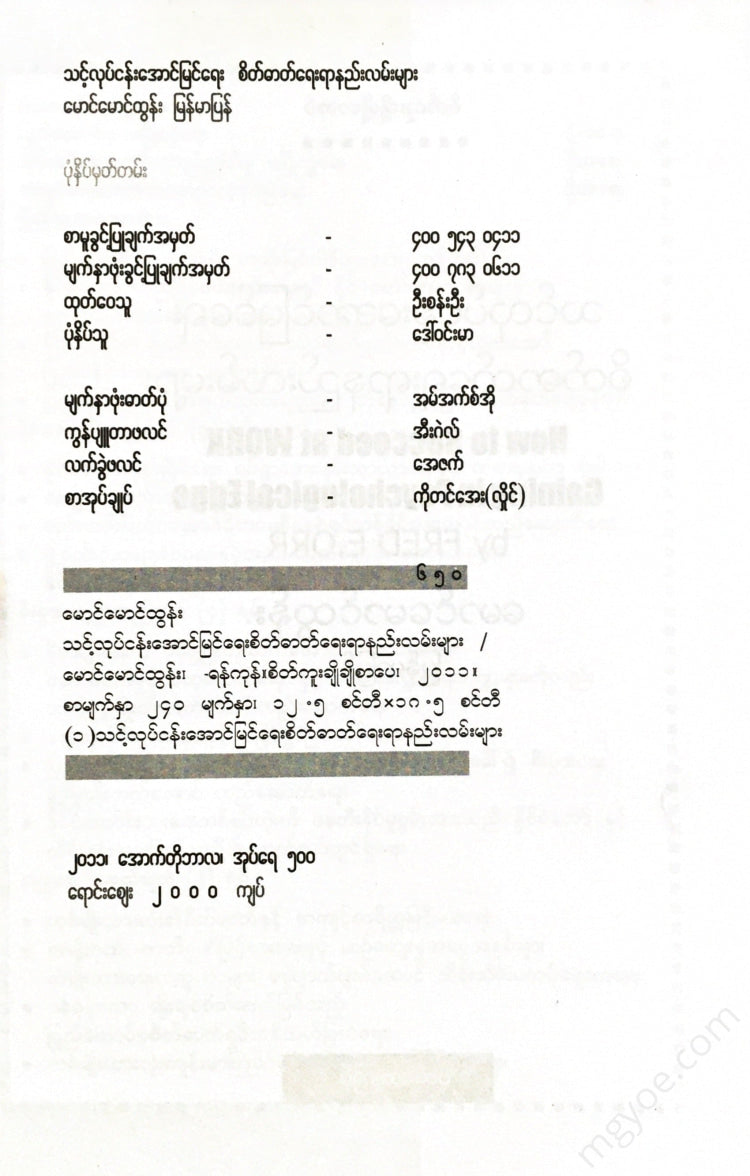စိတ်ကူးချိုချိုစာပေ
Maung Maung Tun - Mental methods for your business success
Maung Maung Tun - Mental methods for your business success
Couldn't load pickup availability
( 1)
Systematic organization and preparation for work success
“ One day I’ll be organized. But I’m not ready to do it today, I’m too busy.” Many people say things like that. What does it mean? We all know the feeling. Emotions rush from one place to another. Sometimes we forget important details. We often go back to deal with things that have crossed our minds. You may come to terms with the fact that you can’t continue living your life this way, in more calm times.
Business success is fundamentally about being organized. If you are feeling calm and are considering various strategies for success, read on. This chapter will provide practical tips for organizational success and greater efficiency. These include using a daily plan, completing the most important tasks first each day, planning for long-term tasks, and thinking systematically and systematically about how to achieve success in your life.
To illustrate the need for an organized approach to your work, let’s look at the chaotic life of a frustrated person. A friend recently came to me for advice. He was worried about his workload and was feeling down. He was a university professor. But for the past year, his workdays had become unsatisfying. He couldn’t enjoy his studies. He woke up restless. His mind was racing. He was waking up late. His mind was racing with projects, lectures, meetings, and other important tasks. He openly admitted that his work life was a slaughterhouse. But the stress didn’t go away. It even affected his home life. Soon, his friends were fewer and his marriage was falling apart.
There are many individuals who are similarly disorganized. How can we help them? First, it is important for everyone to admit that they have at least one problem that is hindering their daily effectiveness. That problem is disorganization. There may be other problems to address, but by assessing the depth and location of your disorganization, you can begin to move forward on the path to a more productive and satisfying work experience.
Assessing your disorganization
Please take some time to read the following points.
* My normal days are wasted doing chores.
* My work is often completed in a chaotic manner.
* I often have difficulty distinguishing between important and trivial tasks.
* I generally wait until the last minute before starting major projects.
* I often start tasks but don't finish them.
* I often find myself unable to decide what to do next after completing a task.
* Having to redo work due to poor personal organization.
* My friends and associates see me as forgetful and absent-minded because I am not organized.
* Don't give me important tasks.
* I missed out on at least one opportunity for promotion because I didn't organize myself well.
Managing your days one by one.
Most people would say that they try to organize their days mentally. But they often forget things. Or they end up doing something they should have done earlier. Trying to remember all the important tasks can be a challenge. Do people who have mastered the basics trust their memory? Generally speaking, they don’t. Most busy people write down their daily tasks. They write them down in a diary, a desktop planner, or a piece of paper that they keep in their pocket. They can add to the list, delete it, or change it.
When it comes to organizing your day, it's important to include non-work-related personal matters. Forgetting about personal matters can be just as frustrating as missing an important work appointment. So be thorough in your list. Include all the work that needs to be done today, as well as your personal tasks.
Building your daily plan in the most effective way is not just about making a list of tasks to be completed, it’s about more than that. Write them down in order to remind yourself of the most important tasks to tackle first. Or, write them out in large, prominent letters to help you focus on the three most important tasks for the day. You might also want to know how long it will take to complete each task. A “Done” column can be a great help when marking completed tasks. Let’s look at an example of a daily plan.
Daily plan
Time
Done
Tasks priority
Enter the stationery shop on the way to work, 122-Landamdao 1.
5 minutes

















